System Information panel or Microsoft System Information (Msinfo32.exe) Tool or MSINFO32 is a built-in utility in Windows 11/10. It provides a system summary and detailed information about Hardware Resources, Components (Sound Device, Infrared, Storage, Ports, Printing, Display, etc.), and System Environment (Program Groups, OLE Registration, Print Jobs, Environment Variables, Loaded Modules, Services, and more). So, if you want to access all such information, then you can open and view the System Information panel in Windows 11 in different ways.
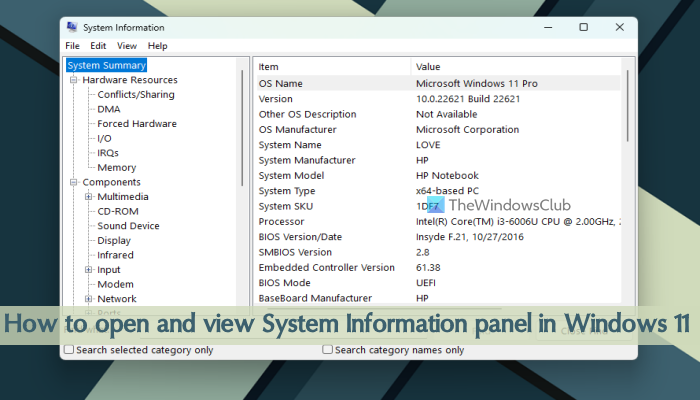
Once the System Information panel is opened, you can expand different categories and check all the available information that will help you diagnose system issues. You can also export all the details as a TXT file, save details as an NFO file (System Information File) or take a print of it to generate a system report using the File menu present on its interface.
How to open and view the System Information panel in Windows 11/10
To open and view the System Information panel in Windows 11/10, you can use any of the following ways:
- Windows Search box
- Windows Terminal app
- Open the System Information panel using Cortana
- Use System32 folder
- Use the Run Command box
- Open the System Information panel using File Explorer
- Start menu
- Use the Task Manager
- Create a desktop shortcut.
Let’s check all these options.
1] Open Microsoft System Information Tool using Windows Search box
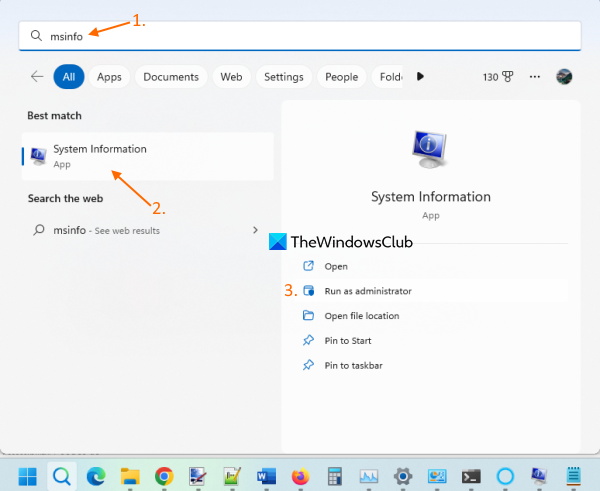
The quickest way to open the Microsoft System Information tool is by using the Windows 11 Search box. You can type msinfo or system information and press the Enter key and it will open the panel.
You can also open the elevated System Information panel by clicking on the Run as administrator option displayed in the search results on the right section.
If you won’t run the MSINFO32 tool with administrative privileges, then it may show some drivers as stopped (even if they are running). So, this is the benefit of running this System Information tool with admin rights.
2] Run MSINFO32 Tool using Windows Terminal app
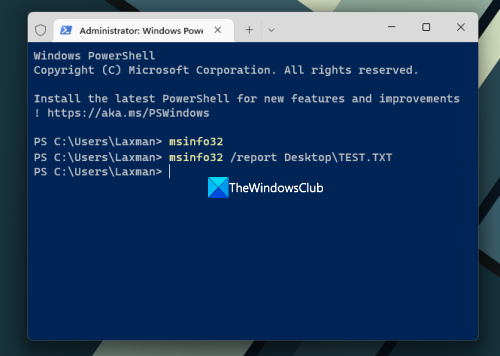
Windows Terminal app also lets you run MSINFO32 Tool with or without administrative privileges using Command Prompt or PowerShell. Here are the steps:
- Right-click on the Search box
- Select Terminal (Admin) or Terminal option (without administrative privileges)
- Now open CMD or PowerShell in the Terminal app
- Type
msinfo32and execute the command.
This will launch the System Information panel.
You can also execute another command to export all the details as a TXT file. It will take some time to prepare and refresh the system information and then the command will be completed. The command is:
Msinfo /report Desktop\TEST.TXT
In the above command, replace Desktop with some other location or path where you want to save the report and TEST with some other file name for the output file.
TIP: you can also open an elevated Command Prompt window or PowerShell window separately to open the System Information panel using the same command without using Windows Terminal app.
3] Open the System Information panel using Cortana
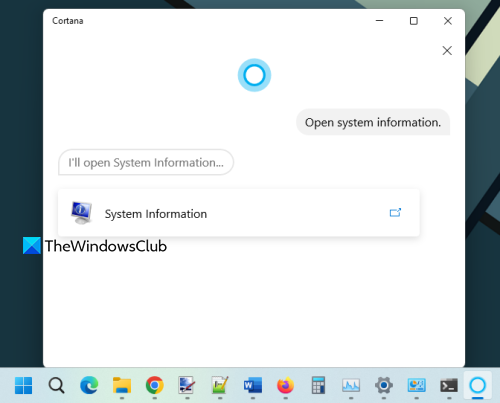
To use the Cortana app in Windows 11 to open and view the System Information panel, follow these steps:
- Launch the Cortana app. Now you need to set up Cortana first if you haven’t already. For this, you need to sign in with your Microsoft account to use it
- Now you can type or Speak to Cortana to open the system information.
It will launch the tool immediately. It will also provide a System Information option on its interface that you can click to open the tool.
4] Open the System Information panel using the System32 folder
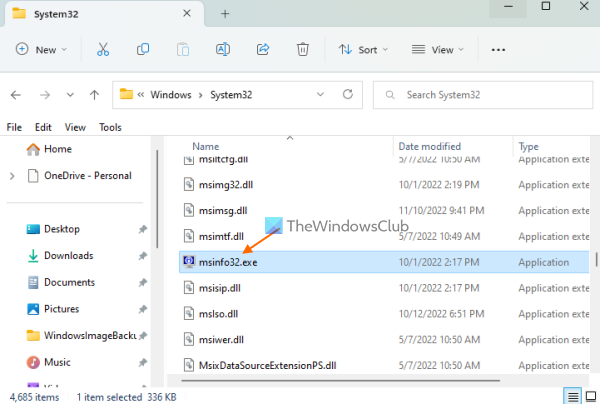
System32 folder stores the application file of the Microsoft System Information tool. Access the C:\Windows\System32 folder on your Windows 11 computer. Scroll down or search for the msinfo32.exe application and execute it. To launch the tool with admin rights, right-click on msinfo32.exe and use the Run as administrator option.
5] Use the Run Command box to launch the System Information panel
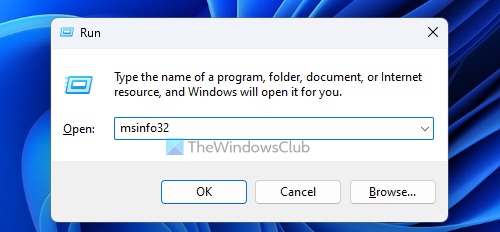
Press the Win+R hotkey to open the Run Command box. Type msinfo32 in the text field and hit the Enter key.
Related: How to open System Properties in Control Panel in Windows
6] Use File Explorer to open the System Information panel
Open File Explorer using Win+E hotkey on your Windows 11 PC. Type msinfo32 in the address bar of File Explorer and press Enter.
7] Open Microsoft System Information Tool using the Start menu
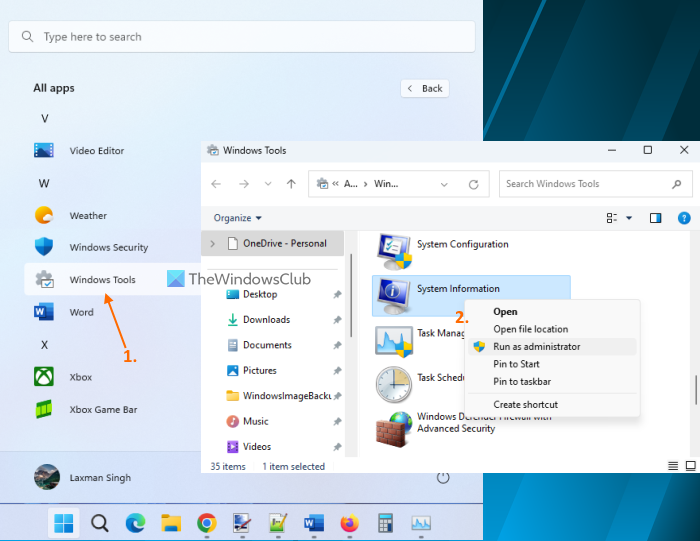
The steps are as follows:
- Click on the Start button to open the Start menu
- Select the All apps button available on the top right section
- Scroll down and click on Windows Tools. A separate window will open
- Double-click on the System Information tool. Or else, right-click on the System Information tool and select Run as administrator to launch it with admin rights.
8] Open and view the System Information panel using the Task Manager
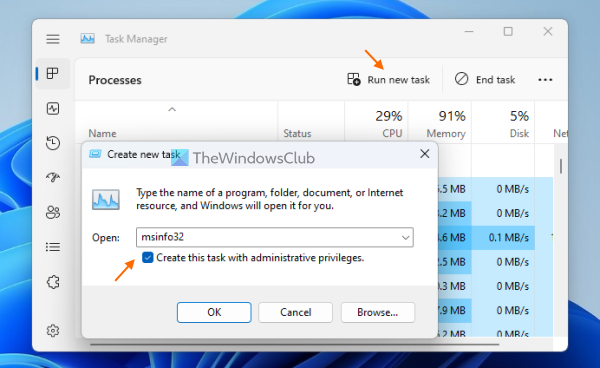
Use the following steps to launch the System Information panel using the task manager:
- Open the Windows Task Manager using the Ctrl+Shift+Esc hotkey
- Click on the Run new task option in the top right part. A small Create new task box will pop up
- Type msinfo32 in the text field of that box
- Select Create this task with administrative privileges option to run the tool as an admin
- Press the OK button.
9] Create a desktop shortcut to open the System Information panel
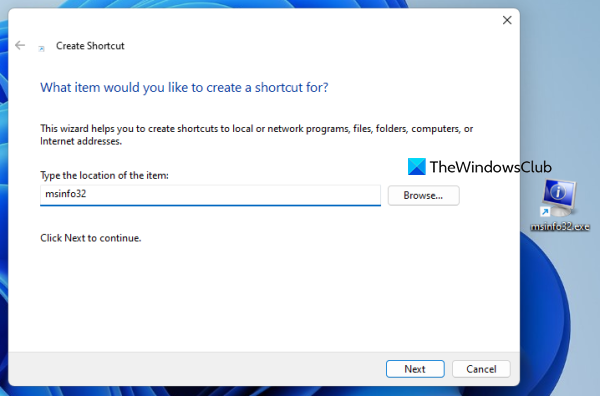
If you need to access the System Information tool regularly, then creating its desktop shortcut will be helpful. The steps are:
- Right-click on your Windows 11 desktop
- Access New and click on the Shortcut option to open the Create Shortcut wizard
- Type msinfo32 in the location field
- Press the Next button
- Add a custom name for your shortcut
- Hit the Finish button.
That’s all! I hope this helps.
Fix: MSINFO32.exe System Information not working
How do I open the side panel in Windows 11?
The side panel or Windows Sidebar was present in Windows Vista and Windows 7, but this feature was discontinued. So, it is not available in Windows 11. Instead, there is a Widgets feature that you can open by clicking on its icon present in the bottom left corner. If you want, you can use the best free Widgets and Gadgets for Windows 11 to add a clock widget, calculator, CPU Meter, etc.
How do I get the Classic Start menu in Windows 11?
To get back the old classic Start menu in Windows 11 or Windows 10, you can use an open-source tool called Open-Shell. In addition to that, if you want to replace Windows 11 Start menu with some other style or scheme, then there are some best free Start menu alternatives (Start Everywhere, Start Menu X, etc.) that you can use.
Read next: 5 System Information Tools in Windows 11/10.
Leave a Reply